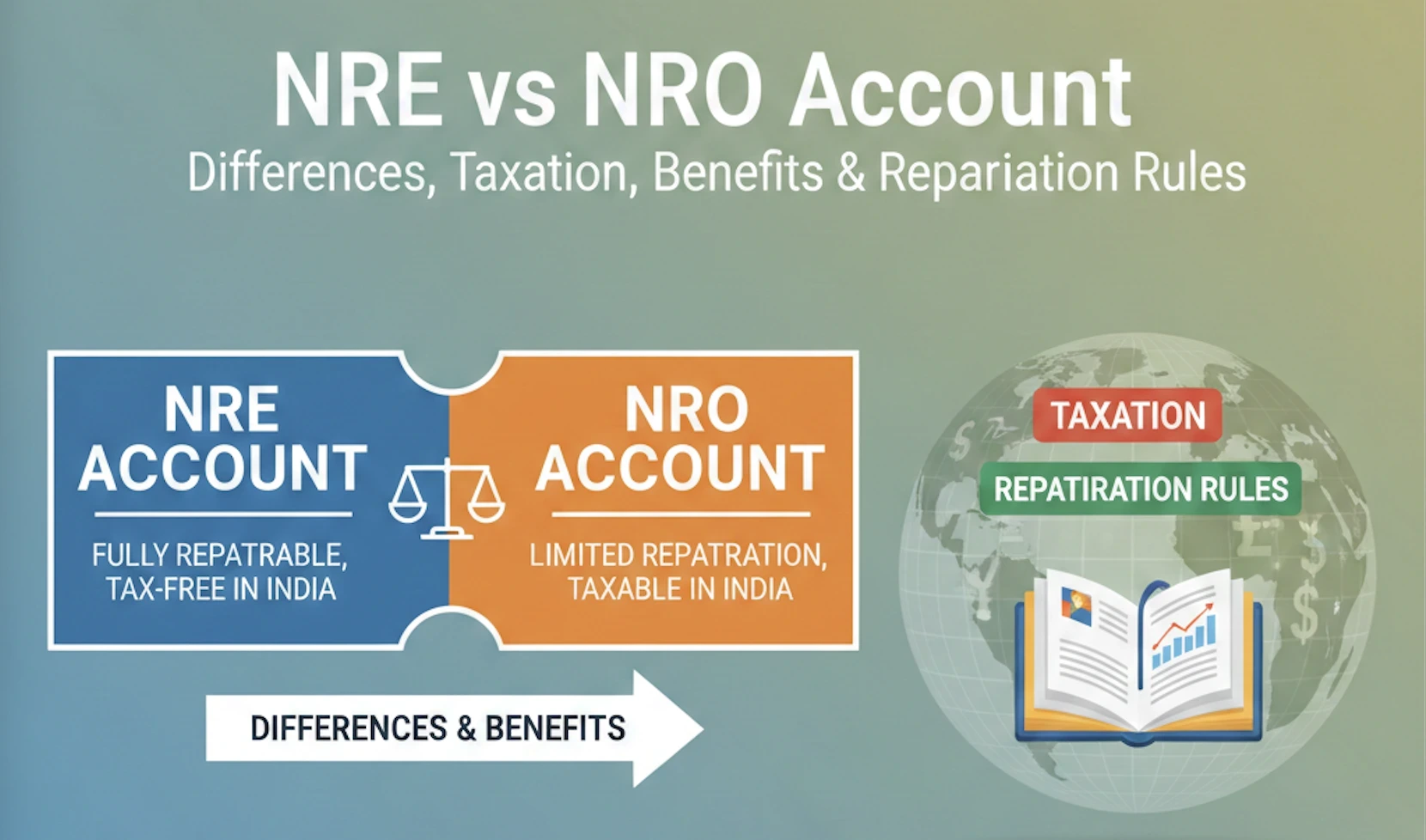Table of Contents
Quality Service Guarantee Or Painting Free

Get a rental agreement with doorstep delivery

Find the BEST deals and get unbelievable DISCOUNTS directly from builders!

5-Star rated painters, premium paints and services at the BEST PRICES!
Loved what you read? Share it with others!

What is the Difference Between NRI, PIO, and OCI: A Clear Comparison for 2026
Table of Contents
Any Indian living abroad with Indian heritage needs to understand the distinctions between NRI, PIO, and OCI. These classifications determine your legal status, taxation requirements, property rights, and investment options in India. While NRI refers to Indians who reside outside India, PIO was a scheme for foreign citizens with Indian ancestry. PIO has now been merged with the OCI program that offers lifelong visa-free travel and specific rights in India without full citizenship.
Key Difference Between NRI, PIO and OCI
The primary distinction between these three statuses is their eligibility criteria, legal implications, and benefits. While NRI status is based on residency, PIO and OCI are designed for foreign nationals with Indian connections.
| Parameter | NRI | PIO (Now Merged with OCI) | OCI |
| Full Form | Non-Resident Indian | Person of Indian Origin | Overseas Citizen of India |
| Basic Definition | Indian citizen residing abroad | Foreign citizens with Indian heritage | Foreign nationals with Indian roots |
| Citizenship | Indian citizen | Foreign citizen | Foreign citizen |
| Passport | Indian passport | Foreign passport | Foreign passport |
| Residency Requirement | Must stay outside India for 182+ days in a financial year | No residency requirement | No residency requirement |
| Visa Requirement | No visa needed | Required visa before merger | Lifetime visa-free travel |
| Property Rights | Can own both residential and commercial property | Limited property rights | Can own property except agricultural land |
| Voting Rights | Can vote if physically present | No voting rights | No voting rights |
| Political Participation | Can participate | Cannot participate | Cannot participate |
| Duration of Status | Based on residency period | Now obsolete (merged with OCI) | Lifelong |
What is NRI (Non-Resident Indian)?
An NRI or Non-Resident Indian is an Indian citizen who resides outside India. According to the Foreign Exchange Management Act (FEMA) of 1999, an individual qualifies as an NRI if they reside outside India for 182 days or more during the preceding financial year. NRIs retain Indian citizenship and passports but have different tax obligations and investment regulations than resident Indians.
Quality Service Guarantee Or Painting Free

Get a rental agreement with doorstep delivery

Find the BEST deals and get unbelievable DISCOUNTS directly from builders!

5-Star rated painters, premium paints and services at the BEST PRICES!
Eligibility for being classified as an NRI
- Must be an Indian citizen holding an Indian passport
- Should have resided outside India for at least 182 days in the previous financial year
- The purpose of staying abroad can be employment, business, education, or any other reason
- Must not be in India for more than 182 days during the financial year
NRI Benefits
- Special bank accounts: NRE (Non-Resident External) and NRO (Non-Resident Ordinary) accounts
- Tax exemptions on income earned abroad
- Higher interest rates on certain deposits
- Freedom to repatriate funds and investments
- Ability to invest in Indian stock market and real estate
- Simplified foreign exchange regulations
What is PIO (Person of Indian Origin)?
The PIO (Person of Indian Origin) card scheme was introduced by the Government of India in 1999 to strengthen the connection with the Indian diaspora. It was designed for foreign citizens who had Indian origins up to four generations ago. Prime Minister Narendra Modi announced in 2014 that the PIO scheme was officially merged with the OCI (Overseas Citizen of India) scheme in January 2015.
Eligibility for PIO status before it was merged with OCI in 2015
- Foreign citizens who held an Indian passport at any time
- Foreign citizens whose parents, grandparents, or great-grandparents were born in or were permanent residents of India
- Spouses Indian citizens or PIOs who had been married for at least two years
- Foreign citizens who were citizens of India on or after January 26, 1950
Countries that were covered under the PIO status
The PIO scheme was available to people of Indian origin from all countries except Afghanistan, Bangladesh, Bhutan, China, Nepal, Pakistan, and Sri Lanka. This restriction was based on geopolitical considerations and bilateral relations with neighbouring countries.
PIO Benefits
- Visa-free travel to India for 15 years
- Exemption from registering with local authorities for stays up to 180 days
- Parity with NRIs in economic, financial, and educational fields
- Same property rights as NRIs (except for agricultural land)
- Access to special quotas in educational institutions
- Eligible for various investment schemes designed for Indians abroad
What is OCI (Overseas Citizen of India)?
The OCI (Overseas Citizen of India) scheme was introduced through the Citizenship (Amendment) Act of 2005 as a form of permanent residency for individuals of Indian origin. It does not grant dual citizenship, which is not permitted under the Indian Constitution, but offers a lifelong visa and many of the same rights as resident Indians. In January 2015, the PIO card scheme was merged with the OCI scheme to create a unified system.
Eligibility criteria for obtaining OCI
- Foreign nationals who were eligible for Indian citizenship on January 26, 1950, or were Indian citizens on or after that date
- Children and grandchildren of individuals meeting the above criteria
- Minor children of OCI cardholders
- Foreign spouses of Indian citizens or OCI cardholders (subject to certain conditions and at least 2 years of marriage)
- Individuals whose parents or grandparents were born in and permanently resided in India
Differences from full Indian citizenship
- Cannot vote in Indian elections
- Cannot hold public office in India
- Cannot purchase agricultural property
- No right to run for constitutional posts
- Cannot work in government services requiring Indian citizenship
- Not eligible for certain government jobs in defence, space, and strategic sectors
OCI Status Benefits
- Lifelong visa-free travel to India
- Multiple-entry, multi-purpose lifelong visa
- Exemption from registration with the Foreigners Regional Registration Office (FRRO)
- Parity with NRIs in financial, economic, and educational matters
- Same entry fees as Indian citizens for national monuments and museums
- Eligible to practice medicine, law, architecture, and other professions
- Can purchase non-agricultural property and inherit ancestral property
How to Apply for OCI Card (Post PIO Merger)
After the merger of the PIO and OCI schemes, all PIO cardholders are eligible to apply for an OCI card. The application process is now online through the Overseas Indian Affairs Ministry's website. It involves filling out an online application, uploading the required documents, scheduling an appointment at the nearest Indian mission, and paying the application fee.
Steps to apply for OCI Card:
- Step 1: Register and complete the online application form at the OCI portal.
- Step 2: Upload the required documents as per specifications
- Step 3: Pay the application fee online
- Step 4: Schedule an appointment with the Indian mission/post or FRRO
- Step 5: Submit original documents for verification
- Step 6: Collect the OCI card or receive it by mail
Documents required for OCI application
- Current passport with at least 6 months validity
- Proof of Indian origin (for applicants or their parents/grandparents)
- Birth certificate
- Marriage certificate (if applicable)
- PIO card (if converting from PIO to OCI)
- Recent passport-sized photographs
- Address proof
- Renunciation certificate of Indian citizenship (if applicable)
- Affidavit for name change (if applicable)
Processing time and fees for obtaining an OCI card
| Category | Processing Time | Fee (in USD) |
| New OCI Application | 6-8 weeks | $275 |
| PIO to OCI Conversion | 3-4 weeks | $25 |
| OCI Card Renewal | 3-4 weeks | $25 |
| Miscellaneous Services | 2-3 weeks | $25 |
| Express/Urgent Processing | 1-2 weeks | Additional $50 |
*Note: Fees may vary based on the country of application and are subject to change.
Renewals and lifetime validity of OCI status
The OCI card offers significant advantages in terms of validity and renewal requirements compared to traditional visas. Following the 2015 reforms, the Government of India simplified the renewal process while maintaining security protocols, making it more convenient for overseas Indians to maintain their connection with their homeland.
- OCI cards issued after 2015 have lifetime validity
- OCI cardholders under 20 years of age need to renew their OCI card once after getting a new passport
- OCI cardholders over 50 years of age need to renew their OCI card once after getting a new passport
- No need for renewal for routine passport renewals between ages 21-49
- In case of a change in personal particulars like name, appearance, or address, OCI card needs to be updated
Which Status is Right for You? NRI, PIO (Now OCI), or OCI
Choosing the right status depends on your citizenship, future plans, and connection to India:
- If you're an Indian citizen living abroad temporarily or permanently, the NRI status applies automatically based on your residency period.
- If you're a foreign citizen with Indian ancestry, the OCI status is most beneficial as it provides lifetime visa-free access to India and numerous benefits.
- For former PIO cardholders, converting to OCI status is recommended to enjoy enhanced benefits and simplified procedures.
Your decision should consider factors such as your duration of stay in India, property ownership plans, investment intentions, and whether you plan to return to India permanently in the future.
How NoBroker Can Help with NRI Services?
NoBroker's specialized services can assist NRIs and OCI cardholders manage their real estate investments in India. With dedicated NRI services, NoBroker offers comprehensive support for property buying, selling, renting, and management from abroad. The platform provides verified listings, legal assistance, documentation support, and virtual property tours for Indians residing overseas or OCI cardholders looking to invest in Indian real estate.
Frequently Asked Questions
Ans: Yes, an OCI cardholder can apply for Indian citizenship if they meet the residency requirements of staying in India for 12 months immediately preceding the application and for 11 years in the 14 years before that.
Ans: NRIs are required to pay taxes on income earned in India but not on their global income. Different tax slabs and regulations apply to NRIs compared to resident Indians.
Ans: No, OCI cardholders cannot vote in Indian elections as voting rights are reserved for Indian citizens only.
Ans: All PIO cards are deemed to be OCI cards. However, PIO cardholders should formally apply for conversion to an OCI card to enjoy all benefits.
Ans: No, OCI cardholders cannot purchase agricultural land, plantation properties, or farmhouses in India as per the current regulations.
Ans: An NRI is an Indian citizen living abroad, while a Person of Indian Origin is a foreign citizen with Indian ancestry. NRIs retain Indian citizenship while PIOs (now merged with OCI) hold foreign citizenship.
Loved what you read? Share it with others!
Most Viewed Articles

NRI Power of Attorney for Property in India: How to Apply, Documents Required and Format
June 1, 2025
30520+ views

Know About ICICI NRI Account: Document Required, Eligibility and Application Process in 2026
January 31, 2025
27114+ views

NRI Accounts in India: List of Best NRE, NRO & FCNR Accounts in 2025
June 1, 2025
18058+ views

NRE vs NRO Account: Differences, Taxation, Benefits & Repatriation Rules
January 31, 2025
9936+ views

TDS on Sale of Property by NRI: Rules, Exemptions & Filing Process 2026
June 1, 2025
9052+ views
Recent blogs in
NRI Rights in India for Property: Ownership, Inheritance & Legal Rules for 2026
November 21, 2025 by Vivek Mishra
What is NRI Certificate: Meaning, Uses, Documents Required & Procedure in India
August 25, 2025 by Vivek Mishra
Power of Attorney from UAE to India: Format, Documents & Legal Process in 2026
August 25, 2025 by Vivek Mishra
Power of Attorney for India Property from UK: Format, Documents & Legal Process in 2026
August 25, 2025 by Vivek Mishra
DTAA Between India And France: Tax Relief, TDS Rules & Benefits in 2026
August 22, 2025 by Kruthi









 Full RM + FRM support
Full RM + FRM support
Join the conversation!